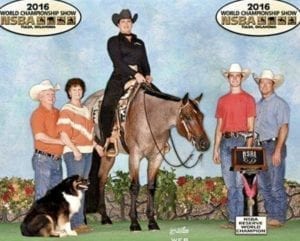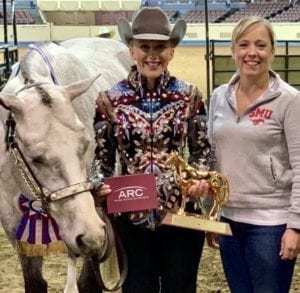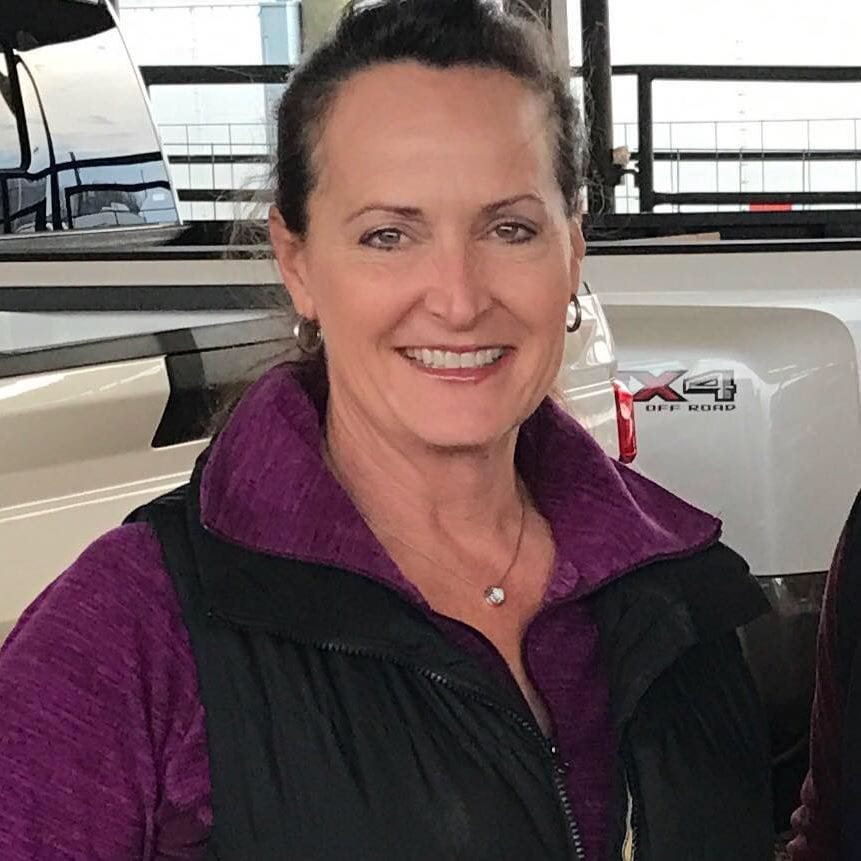Flashing back to a time when the internet was only a thought – horse shows were planned, but the patterns could not be released before the day of the horse show. Instead, exhibitors found their patterns posted on walls the day of the show, leaving them with no clear idea of the maneuvers they would be asked to perform that day.
To prepare for a show, exhibitors practiced fundamental horsemanship skills to ensure they could perform any tasks they could encounter in the show pen. Bonds formed based on vital preparation propelled teams to World Champion titles.
Nowadays, the practice routines for horse shows are a little bit different. Through advancements in technology, exhibitors can have easy access to all of our horse show patterns weeks in advance through sharing on social media or websites like Horse Show Patterns.
In preparation of upcoming shows, exhibitors read and practice their patterns until near perfection, bringing to light many questions on the real effects of over-practicing your pattern horse. Have exhibitors become reliant on schooling patterns in the weeks before shows? Does this reliance negatively affect our horsemanship skills? How are our equine partners effected by practicing patterns in advance?
For further insight into these questions, we talked to several AQHA professionals.
Are exhibitors reliant on schooling patterns in the weeks before shows?
 Kelly Smith: I think exhibitors today are capable of performing patterns even if they are not provided ahead of time. That being said, having access to patterns before the show is a resource that has many positive effects for trainers, exhibitors, horses, and shows.
Kelly Smith: I think exhibitors today are capable of performing patterns even if they are not provided ahead of time. That being said, having access to patterns before the show is a resource that has many positive effects for trainers, exhibitors, horses, and shows.
 Christie Arrington: Yes, many people rely on the patterns to come out in advance to practice before going to the shows. As a trainer, I find it helpful when we are going to a show with many customers or going to a facility that does not have a lot of room to practice because we can lay out our patterns and go over critical parts of the pattern.
Christie Arrington: Yes, many people rely on the patterns to come out in advance to practice before going to the shows. As a trainer, I find it helpful when we are going to a show with many customers or going to a facility that does not have a lot of room to practice because we can lay out our patterns and go over critical parts of the pattern.
 Richard Spinks: Having access to patterns ahead of time is a double-edged sword. Exhibitors are reliant on having patterns in advance. Thus they become upset if they do not have the patterns early. A true rider should be able to show up and perform the pattern either way. In my opinion, a judge should be harder on you when you make mistakes while showing after having had the patterns for many weeks. I believe true horsemen practice maneuvers, not patterns.
Richard Spinks: Having access to patterns ahead of time is a double-edged sword. Exhibitors are reliant on having patterns in advance. Thus they become upset if they do not have the patterns early. A true rider should be able to show up and perform the pattern either way. In my opinion, a judge should be harder on you when you make mistakes while showing after having had the patterns for many weeks. I believe true horsemen practice maneuvers, not patterns.
Does having the patterns for shows in advance affect our horsemanship skills? Brad Jewett: For me, there is no effect on my riders’ horsemanship skills because we do not school the pattern in its entirety. As a whole, I think it allows riders to be more prepared in the show pen.
Brad Jewett: For me, there is no effect on my riders’ horsemanship skills because we do not school the pattern in its entirety. As a whole, I think it allows riders to be more prepared in the show pen.
Kelly Smith: Exhibitors learn patterns in different ways. Some riders can learn a pattern quickly by just looking at it on paper while others have to break it down and learn it in parts or use a tactical approach by walking the pattern on foot and riding the pattern. Accessibility to patterns before shows allows trainers and exhibitors to use a comprehensive approach to teaching and learning patterns, ensuring each exhibitor a chance to showcase their horsemanship skills to their potential Jodi Finkenbinder: I do not think having the patterns in advance has a positive effect on horsemanship skills. I feel like developing necessary competencies in communicating with your horse, and performing maneuvers is the most valuable asset an exhibitor can have. I also think we lose the ability to sharpen our skills to memorize and execute a pattern on the fly. The ability to practice a pattern over and over until it becomes automatic is a detriment to those horsemanship skills.
Jodi Finkenbinder: I do not think having the patterns in advance has a positive effect on horsemanship skills. I feel like developing necessary competencies in communicating with your horse, and performing maneuvers is the most valuable asset an exhibitor can have. I also think we lose the ability to sharpen our skills to memorize and execute a pattern on the fly. The ability to practice a pattern over and over until it becomes automatic is a detriment to those horsemanship skills.
 Melissa Dukes: You can improve your horsemanship skills as long as you are asking for the maneuver and the horse is not anticipating the next movement. I believe training and drilling are two different things. If you train your horse to do the maneuver, then it can be done in a pretty way, but if you drill your horse then, the maneuver becomes forced.
Melissa Dukes: You can improve your horsemanship skills as long as you are asking for the maneuver and the horse is not anticipating the next movement. I believe training and drilling are two different things. If you train your horse to do the maneuver, then it can be done in a pretty way, but if you drill your horse then, the maneuver becomes forced.
 Shannon Vroegh: My customers are more relaxed because they are very familiar with the pattern and not trying to cram it all in in a day. I’ve seen it make my clients become better horsemen because they want to come practice to be prepared for the horse show, whereas before, they may not have wanted to, because we didn’t know the pattern. Also, I think the biggest key to being a horseman is being able to correct the things that go wrong in a pattern instead of just being able to do the pattern.
Shannon Vroegh: My customers are more relaxed because they are very familiar with the pattern and not trying to cram it all in in a day. I’ve seen it make my clients become better horsemen because they want to come practice to be prepared for the horse show, whereas before, they may not have wanted to, because we didn’t know the pattern. Also, I think the biggest key to being a horseman is being able to correct the things that go wrong in a pattern instead of just being able to do the pattern.
How are our equine partners effected by practicing patterns in advance?
Brad Jewett: I think our equine partners are entirely dependent on the skill level of the rider. I believe it has less to do with having the pattern early, and more to do with the rider or trainer’s ability to recognize when enough is enough. Some horses need the extra work on a specific maneuver to get through that part of the pattern during the show. I do not think over-practicing patterns is good for the horse.
 Chele McGauly: One of the problems I see most often is a horse that is overly anxious and anticipates a maneuver before the rider asks for it. This is most often caused by riding a pattern over and over until a horse feels that he can do it on his own and no longer needs guidance. When this occurs, ‘willingly guided’ goes out the window, which usually causes a less than stellar performance.
Chele McGauly: One of the problems I see most often is a horse that is overly anxious and anticipates a maneuver before the rider asks for it. This is most often caused by riding a pattern over and over until a horse feels that he can do it on his own and no longer needs guidance. When this occurs, ‘willingly guided’ goes out the window, which usually causes a less than stellar performance.
Jodi Finkenbinder: Over-practicing the same pattern creates anticipation by your horse, which can reflect penalties in your score. It also creates sourness in your horse as they tire of doing the same pattern over and over again. Expression plays more of a role in a pattern than some exhibitors realize. For example, a horse with its ears pinned is not a very pretty picture and does not result in a positive score.
Shannon Vroegh: I do think it puts a hindrance on the horses learning the pattern, but in my program, we school the patterns before the shows and then can put less time into schooling at the horse shows by just doing pieces. I feel this saves wear and tear on the horses because we don’t have to practice so hard at the horse show as well as the show.
****
Do you think having the patterns before shows helps you or hurts you? Let us know in the comments.








